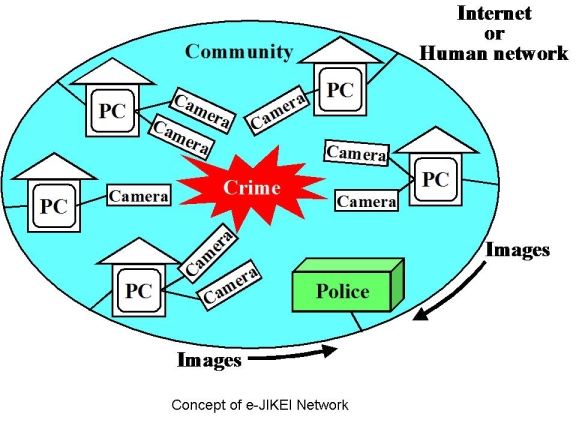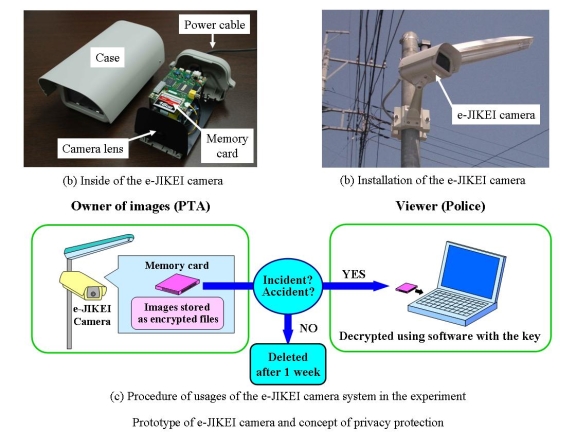The NPO e-JIKEI Network Promotion Institute
We contend that a community will have a strong ability to prevent crime only if some residents keep watch on what happens around their houses with the aid of their own home computers, commercially available cheap cameras, and free-software. Under this scheme, residents would view their surroundings using cheap cameras as their own eyes and home computers as their own brains. Community safety would thus be realized by the voluntary cooperation and altruism of ordinary citizens using widespread modern technology.
A community with some residents keeping occasional watch around their houses has the potential to inhibit crime. In days gone by, there were many communities like this. However, in our times, when individualism and selfishness become increasingly common, there are very few communities like this resulting in a lack of eyewitnesses to crimes in our communities.

On the other hand, security camera systems are now widely used and have an important role in reducing crime and identifying suspects. As for the typical usage of the security cameras systems, many problems seem to arise from the fact that they are introduced only for the benefit of the owners. One problem is that it is expensive to obtain a complete surveillance of an owner's property. A second problem is that a typical system usually keeps watch only inside the owner's property, so it cannot help with the overall safety of the community. A third problem is that it sometimes gives the unpleasant feeling to the neighbors in case the system watches outside the owner's property. The authors argue that these problems can be solved if the camera systems are introduced within an altruistic community-minded framework.
We contend that a community will have a strong ability to prevent crime only if some residents keep watch on what happens around their houses with the aid of their own home computers, commercially available cheap cameras, and free-software. Many types of software for capturing video image are available, however we could not find a free one that is suitable for the concept. Therefore, we have developed one with the minimum necessary functions and distributed it free of charge through our web site [1]. The software is written in English and in Japanese. The software simply selects relevant pictures and saves them to hard disk [2]. The concept has been discussed form the viewpoints of the social science [3] and the homeland security [4].
PC based system using free software
We have provided the first version of the free software "Dairi EYE standard". Its functions are very limited but essential. The major features of the software are as follows,
(a) High stability: Continuous running of more than 100 days has been confirmed.
(b) High operationality of file storage: The file name and its path express time and location information.
(c) Minimum necessary storage: Simple picture selection software has been adapted. The software saves a picture only when the difference between two consecutive pictures exceeds the threshold.
(d) Automatic delete: Folders that are older than the save period set by the owner are automatically deleted
(e) Compatibility with many types of camera: Software can operate in the VFW mode (PC cameras and USB video adapters) and FTP mode (network cameras).
(f) Simultaneous operation: Software can operate several cameras connected to a PC.
(g) No Internet connection: Concerning privacy, the function of connecting to the Internet was removed from the distributed version of the software. Even in this case, the e-JIKEI Network can be formed, in which the word "Network" refers not to the Internet but to the personal network of the residents.
If the system of security cameras connected to computers and to the Internet
spreads nationwide, it could result in a very powerful and flexible social
structure, since no one can commit a crime without being reported and the
software installed in each system could be easily upgraded. This means
that this social structure could lead to very interesting subjects and
applications for researchers and companies. In the near future, more intelligent
functions could be achieved, such as function of detecting the doubtful
motion, function of sending of danger messages to the police, and function
of facial comparison with the photos of wanted persons. Real-time chasing
of suspected persons and rescuing kidnapped children will be possible if
the crime is very bad and most of the citizens give the police permission
to access their own surveillance system. A country with many local communities
having this facility will obtain good homeland security. For homeland security,
our project [4] and all the other projects, such as the usual security
camera systems and the US Home Guard [5], in which registered ordinary
citizens watch the critical infrastructure facilities in the United States
from their homes through internet-cameras, should be complementary to each
other.
Concept for privacy protection [6]
We propose a new concept regarding the management of security cameras in which those who own and manage images (the owner) and those who have the right to view the images (the viewer) are separated by means of the encryption of the images. Using this concept, encrypted images are transferred from the owner to the viewer only when both the owner and the viewer consider it necessary, such as in the case of crimes; then the encrypted images are restored for viewing by the viewer. By this method, the images can be viewed only when absolutely necessary. This concept was proposed to prevent the risk of privacy violation, as well as to reduce the unnecessary psychological burden that third parties may be subjected to, with the aim of promoting the placement of security cameras throughout local communities.
By managing the security camera system using our concept, it is possible
to markedly reduce the negative effects associated with the introduction
of security cameras, such as concerns over the violation of privacy, without
reducing the positive effects, such as crime prevention at places other
than those requiring high-level security and constantly manned surveillance,
i.e., most communities; while providing recorded images to investigating
authorities in the case of crime.
In a practical example carried out in Kiryu City, Gunma Prefecture, a personal computer (PC)-based security camera system is owned and managed by the owners of retail stores affiliated with the merchant association, and images are encrypted and stored in the system. To view the stored images, special software installed in the PCs at the Police Department of Kiryu City must be used. Only when the owners of the retail stores and the police determine that it is necessary to view them, are the stored images transferred from the owners of the retail stores to the police. Then the stored images are viewed by the police and used as information for investigations. The encrypted images that are stored at retail stores are automatically deleted after 30 days if no incidents or accidents have occurred.
All-in-one system "e-JIKEI Camera"

We have developed a prototype of security camera systems "e-JIKEI Camera". The e-JIKEI Camera is used to realize our concept of a security camera system in which those who own images (the owner) and those who have the right to view the images (the viewer) are separated by means of image encryption. This concept was suggested with the aim of preventing the risk of privacy violation, reducing the unnecessary psychological burden that third parties may experience, and promoting the placement of security cameras in local communities.
In the current all-in-one security camera in the e-JIKEI Network, the camera has to be opened to remove the memory card. However, this inconvenience is preferred from the viewpoint of privacy protection, especially in the initial stage of society's gradual acceptance of our concept. However, in the near future, the cameras will be connected to the Internet after the information security system between the owner and viewers is established. Thereafter, online operations of solving crime, such as the rescue of kidnapped children, can be implemented.
Conclusions
We are asking the citizens how they compare the responsibility on watching what happens around their houses with the risk of the violation of privacy. We are now commencing tests on the true value of our concept.
References
[1] Society for e-JIKEI network: http://www.e-jikei.org/index_e.htm
[2] Y. Fujii, N. Yoshiura and N. Ohta, " Community security by widely
available information technology", Journal of Community Informatics,
Vol. 2, No. 1 (2005)
[3] Y. Fujii, N. Yoshiura and N. Ohta (2005). Creating a worldwide community security structure using individually maintained home computers: The e-JIKEI Network Project, Social Science Computer Review, 23(2), 250-258.
[4] N. Yoshiura, Y. Fujii and N. Ohta (2005 May). Using the security camera system based on individually maintained computers for homeland security: The e-JIKEI Network Project, Proc. IEEE IMTC 2005, 101-105, (Ottawa, Canada).
[5] US Home Guard: http://www.ushomeguard.org
[6] Y. Fujii, K. Maru, N. Yoshiura, N. Ohta, H. Ueda, Y. Sugita, "New
concept regarding management of security cameras", Journal of Community
Informatics, Vol. 4, No. 3, 2008.